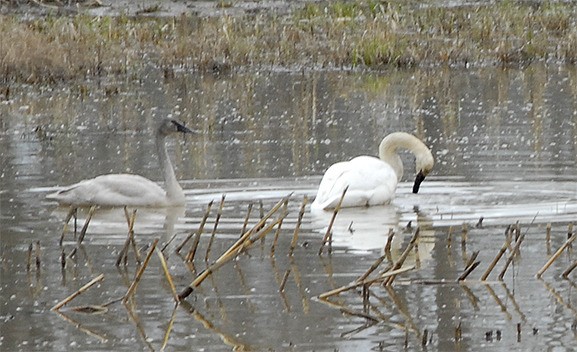Trumpeter Swans are almost ready to leave the area and head north for another breeding season, but for some of them, the road ends here.
Martha Jordan, a member of Washington Swan Stewards, reported last week that at least 40 swans had died in the past two weeks in the Carnation-Fall City area. She also speculated that the cause of death for many of them was poisoning from lead shot that the birds accidentally take into their gizzards instead of stones, to help break down their food.
Jordan is “the swan lady,” says Washington Fish and Wildlife Sergeant Kim Chandler, and is known in his department for her work to protect swans, and to pick up their carcasses for study.
“If we ever find one, and we’re not able to get to it, we call her,” said Chandler.
Often the necropsy, or examination of the remains, does indicate lead poisoning in swans, Chandler said. The metal is soft, and breaks down in the gizzard over time causing similar symptoms to those of a human with lead poisoning.
However, he said, so far this year, he hasn’t gotten any reports of dead swans in King County.
“To find one (dead swan) is one thing, to find one or more right in the same spot, I’m more suspicious of power lines,” he added.
Trumpeter swans, much larger than geese and other common area waterfowl, fly lower to the ground, and many have died from hitting power lines, Chandler explained. Since they fly close in a V formation, it is likely that several of them could hit a power line before the rest of the flock becomes aware of the danger and breaks up the formation.
“Lead poisoning is also an issue. That’s where you see mostly sick ones, but not necessarily dead ones.”
How to tell if a swan is sick?
“If it is alone in a field or wetland, likely it is ill,” Jordan wrote in an e-mail message to a swan group. “If a swan is sitting up on shore alone or even with a single family group it may be (that) one or more members is ill.”
Whether the swan is sick or dead, Jordan urged people to call her to report it at (206) 713-3684 or send an e-mail to mj.cygnus@gmail.com.
“All swans found dead need to be collected quickly to prevent raptors, especially eagles, from eating them and getting secondarily poisoned from the lead shot in the gizzards and intestines of the dead swans,” Jordan wrote.
Geese and other waterfowl can be poisoned in the same way, although swans are more susceptible, Chandler said, because their longer necks enable them to reach deeper into ponds, and to sometimes pick up lead shot with the pebbles they need in their gizzards.
Lead shot has been illegal nationwide for waterfowl hunting for years, Chandler said, although it is legal for some hunting uses in Washington. He speculated that a full ban might happen in the state in the future.



